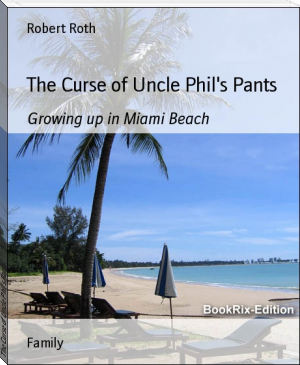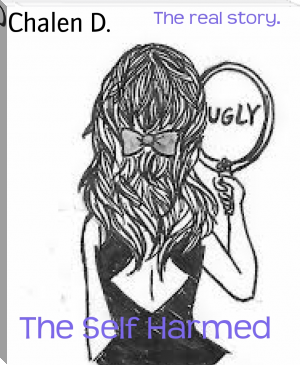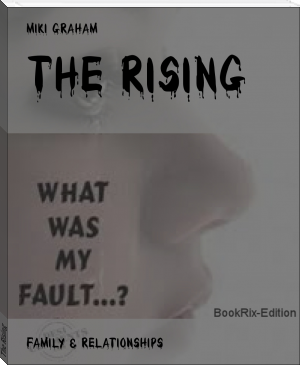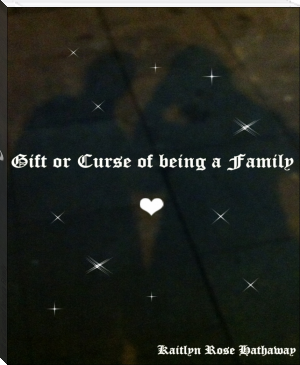The Curse of Uncle Phil's Pants - Robert Roth (best love story novels in english .TXT) 📗

- Author: Robert Roth
Book online «The Curse of Uncle Phil's Pants - Robert Roth (best love story novels in english .TXT) 📗». Author Robert Roth
The Curse of Uncle Phil’s Pants
Growing up in Miami Beach
Tell someone you grew up in Miami Beach and right away they start talking about South Beach and how cool and hip it is. And you know, maybe now it really is. But in the early 1960s, when I was still a kid, South Beach was nothing more than just a ghetto for old people.
There were millions of them back then, or so it seemed. They clogged the sidewalks, crowded the hotel verandas, and took over the benches on the beach. They came from countries like Latvia and Estonia. They spoke mainly Yiddish, and English with heavy Eastern European accents. The men sat for hours playing pinochle or reading Hebrew newspapers. The women played canasta or Mah-jongg. Everybody was either a democrat, or a socialist, or a Zionist. They gave impassioned political speeches to the crowds on the beach.
They were an irritable and disagreeable lot. They seemed always to be at war with us kids, and it was hard to imagine that they ever had any children of their own. They were as poor as they were old, having worked their whole lives in factories and garment mills up North. Now they lived on meager pensions. They came to South Beach because it was cheap and warm, and because nearly everyone there was Jewish.
But for every poor Jew that lived in South Beach, you could find three or four in Miami Beach proper who were rich. Very rich, some of them. They owned practically everything in sight: hotels, apartment buildings, nightclubs, department stores, restaurants. Some were land developers, others prominent doctors or lawyers. Their houses were usually big, two-story Spanish affairs surrounded by lots of coconut palms. Their children drove XKEs and Corvettes to school. The wealthiest lived on the islands in Biscayne Bay. You reached their homes by private causeway or by speedboat if you were lucky enough to have a father who owned one.
I certainly wasn’t. My parents barely got by. And while we somehow escaped having to live in South Beach proper, our last apartment was south of Lincoln Road, which was sort of the unofficial DMZ between the haves and have-nots.
My parents moved to Miami Beach from Brooklyn in 1944 at the urging of my mother’s oldest sister, Betty, and her husband Dave. Uncle Dave was well off; he owned a garment factory in Brooklyn. Featherknit Sweaters. “Look sweeter in a sweater” — that was their slogan. Dave was a short, gruff man who was never without a cigar in his mouth. His favorite expression was “Go shit in your hat.” He had a weird sense of what constituted play. When I was little, he would grab me and clamp his hand around my thigh, then squeeze until I screamed uncle.
Despite the pain he inflicted, Uncle Dave remained my favorite uncle as I was growing up. Looking back, though, it wasn’t he as much as his directness that I was most drawn to. You always knew where you stood with Uncle Dave, which, if you were smart, was at least six feet from wherever he happened to be.
Dave and Betty were the first in the family to ever vacation in Miami Beach. They returned to Brooklyn with glowing reports. “It’s the promised land,” Betty kept telling my mother. “No cold. No snow. And tons of opportunity!” That was important news for my parents. They were finding it increasingly difficult to tolerate New York winters. To make matters worse, my father had quit another job and wasn’t working at the time.
Dave happily offered to pay their way down there. As the de facto patriarch of that side of the family, he had supported my mother on and off since she was in high school. Now it looked like he might have to support both my parents. I think he viewed this as an opportunity to save money, in that if my parents remained in Brooklyn, they would end up costing him a lot more in the end.
My mother was a polio survivor, having been stricken with the disease as a toddler. She wore a steel brace on one of her legs and walked with the help of crutches. She was obsessively devoted to my father, who was the dreamer in the family. The first thirteen years of his life were spent in a charity hospital, recovering from the effects of Potts disease, tuberculosis of the bone caused from drinking unpasteurized milk It stunted his growth and curved his spine.
Like a prisoner, he spent every moment in that hospital dreaming of the day he would get out. After he got out, he just never stopped dreaming. Sadly, by the time I entered Miami Beach Senior High, only a couple of his dreams had come true.
My father had studied electronics when he was younger, so he opened a small radio repair shop on 23rd Street during the War. Rite Radio. The hotel next door to the shop housed the offices of a bookmaking consortium known as the S & G Syndicate. My father soon sold the repair shop and went to work for them, first as their radio man and then as part of a team working the bookmaking concession in one of the oceanfront hotels.. He would stay up in the room, and the guys who worked the pool and cabana would call the bets up to him. If the bet was made at or right after post time, he was not allowed to accept it. This pissed the pool guys off to no end, as they were always working scams of their own. My mother worked for the S & G, also, taking bets over the telephone.
That didn’t last very long. One day, one of the pool guys, enraged because my father refused to take his bet, charged up to the room and tackled him to the floor Right then and there my father decided he didn’t have the stomach or the build to be a bookie, so he quit the bookmaking business, took the money they had made, got a partner, and bought a half-completed 6-unit apartment building in Coral Gables. After he built it out, we lived in it for a few months. Then he sold it. He took that money, found a new partner and built the first motel on Brickell Avenue in downtown Miami — The Towne Motel. He sold it six months later, bought frontage property across from the University of Miami, then sold that. Next, he uprooted us, and we moved lock, stock and barrel to Mexico City. His idea was to duplicate his success with the Towne Motel by building the first motel on the Reforma in Mexico City. It was a terrible idea. Less than a year after our grand Mexican adventure began, my father drove us back to Miami Beach in defeat.
After that, my parents took the money they had left and began speculating on the stock market. They must have had some sizeable triumphs at first, because my father soon made a fulltime job out of it. Every day, he would go sit at the Bache & Co office on Lincoln Road and watch the big board pass by. He did this for seven years as we slowly went broke.
I was going through a decline of my own during those years. Upon our return from Mexico, my father crammed us into a tiny efficiency apartment, where we all slept in the same room. We lived that way for two years. It put me in different school district, but my father talked them into letting me continue at my old elementary school. It was too far to walk, so I rode the city bus to school every morning with an army of maids and other hotel workers. The bus was hot and filled with the smell of sweat and musty clothes. I held my breath a lot.
The worst thing about where we lived wasn’t the bus; however, it was the scarcity of children. There was simply no one my age to play with. Cut off from classmates, after-school activities, just about everything, my solution was to withdraw into myself. And like my father with his dreaming, once I started that, I found it difficult to stop.
By the time I reached high school, I had withdrawn enough to achieve full “loser” status. Disregarding some of the obvious causes of that — my acne, my gangly stance, my awkwardness around girls, my general fear of people, and my taciturn nature — I blamed my troubles on the handiest thing I could find, my Uncle Phil’s pants.
Uncle Phil was married to another of my mother’s sisters, Winnie. It was a second marriage for him and a first for Winnie. I didn’t like Uncle Phil much. No one in our family did. He was stingy, cold and disapproving. He was also Orthodox and kept kosher, which was a pain in the ass when they came down for their annual visit. Actually, it was mostly a pain for Aunt Winnie; she wasn’t Orthodox.
They stayed at Waldman’s, a few doors down from the Fontainebleau. Its distinction as a hotel was that it was totally kosher, down to having the elevators stop automatically at every floor from sundown Friday to sundown Saturday, so that the pious wouldn’t have to push buttons on the Sabbath. There was a manual elevator, also, for those more secular types. That was the car my Aunt Winnie used. Invariably, when she got on, others got on with her. “Do me a favor and push six,” they’d say innocently. Winnie would smile. “Push it yourself,” she’d answer. I never could fathom how someone that devilish could be married to a sourpuss like Phil. Later I understood. It was for the money. Like Uncle Dave, Phil, too, owned a garment factory. And he was loaded.
Not that he shared any of his great wealth with me. All my aunts and uncles from both sides of the family made annual pilgrimages down to visit us every winter. They would always slip me money, a ten or a twenty, sometimes more. But not Uncle Phil. His generosity was limited to pants. Every August, the postman would deliver a soft, lumpy parcel wrapped in heavy brown paper and tied with twine. The sender was the Reliable Clothing Co. in Brooklyn, New York, my Uncle Phil’s company. Inside lay the bane of my teenage existence: six new pairs of his “Continental Styled” pants.
As far as I was concerned, he might as well have sent me leprosy. Because what separated the cool from the un-cool at Miami Beach Senior High was not only what your clothes looked like, but also where you bought them. Back then, there was no Hugo Boss or Ralph Lauren, and if there were, it wouldn’t have mattered. Because we had the Dinghy and The Stag Shop, and they had their own expensive private labels, which, if you didn’t wear them, turned you into something akin to an untouchable in India.
Even a blind person at fifty paces could see that Uncle Phil’s pants lacked the right pedigree. Attired in pants from the Dinghy, you were ready pose in the teenage version of “What Sort of Man Reads Playboy.” In Uncle Phil’s pants, you didn’t stand a chance. They were sewn from cheap, scratchy wools





Comments (0)